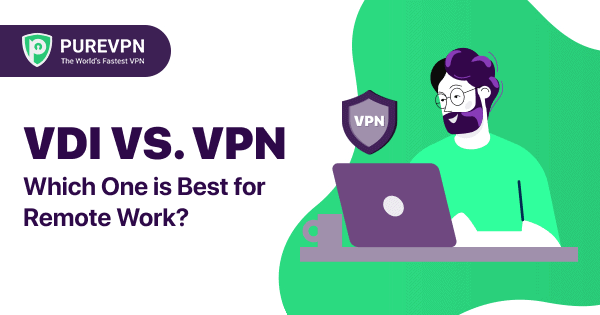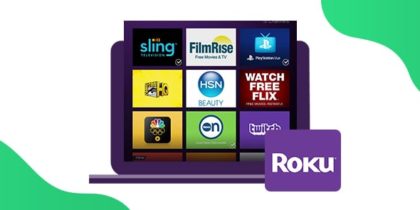It’s 2021, and COVID-19 is still far from gone. Millions of people continue to work from home across the globe, but there are serious security risks involved. Hackers have been leveraging remote work vulnerabilities to capitalize on the situation for their benefit, forcing both small and large businesses to adopt new security measures in order to protect their data and systems. There are two tools that can come in handy when it comes to working remotely: a VPN and VDI. However, which is right for your company? In our VDI vs. VPN guide, you’ll learn the differences between both technologies and their respective pros and cons so that you can make an informed decision. Without further ado, let’s get started:

What is VDI?
Virtual desktop infrastructure (VDI) is a virtualization system that consists of hosting desktop environments on centralized servers and deploying them to end-users (i.e. employees) over the network. The desktop environment is accessible on any device using certain applications and can be personalized as well.
With VDI, servers typically reside on-premise or the cloud (online). Each device in a VDI system is capable of functioning independently, but they all can be managed from a single control point if need be. These separate virtual machines have dedicated resources available to them, resulting in better overall security.
There’s also room to improve performance and customization capabilities. For instance, you need multiple desktop PCs for your employees. If every employee’s computer has different security configurations, they’ll have to be upgraded constantly. Using VDI, you can carry out the processes remotely in a virtual environment.

What is a VPN?
Many businesses use a VPN for companies for remote working purposes. It encrypts users’ communications and hides their IP addresses by transmitting their data via a remote server. It’s one of the easiest ways to improve privacy and protect your organization’s data from prying eyes. And all it takes is downloading an app and connecting to a VPN server.
If you wish to learn more about a VPN, visit here.
You might be wondering why even use a VPN if it only secures one device? Well, your office router can be configured to run a VPN, protecting every device connected to it. Some providers even allow up to 10 devices to be associated with a single user login. You can also encrypt the traffic inside your company’s network using a VPN.
By establishing a VPN connection using the app on their devices, employees can connect to the office without being there physically and access files and resources, all while significantly reducing the risk of breaches.

VDI vs. VPN
Now that you know what sets VDI and VPN apart from one another, let’s take a look at how they fare in facilitating remote work for employees:
VDI
Advantages of Using VDI for Remote Work
Centralized Management
Since an admin has centralized access with VDI, they can implement fixes and updates quickly and easily. What’s more, these adjustments are made across multiple devices in one go.
More Admin Control
Businesses have greater control over the system and can ensure all employees are connected. This is due to the fact that VDI infrastructure is often implemented on the company’s server-side. Plus, there’s less reliance on the performance of devices used by users.
Fast Performance
Users have their own dedicated systems, so they can make customizations as they see fit. Having such adjustability allows for quicker performance.
Disadvantages of Using VDI for Remote Work
Too Costly
VDI systems are expensive in comparison to VPNs as they require a lot of different components, making them suitable only for large businesses with extensive financial resources.
Complicated Implementation and Maintenance
VDI setups usually consist of various components, multiple machines, and complicated installation procedures. Additionally, given that they’re focused on the server-side, updating them isn’t exactly a straightforward affair.
VPN
Advantages of Using a VPN for Remote Work
More Affordable
VPNs won’t cost your business an arm and a leg as these tools are cheaper than VDI systems. In fact, you can cover multiple devices with a single VPN account using a configured router.
Simpler to Implement
You don’t need extensive infrastructure on-site to take advantage of VPN, so implementing updates and fixes is much easier for companies.
Easy to Use
With VPNs, the user experience is intuitive and smooth. To establish a secure connection, all your employees have to do is push a button.
Additional Features
Unlike VDI, a VPN will give companies access to many extra features like a kill switch to automatically disconnect the internet if the secure remote VPN connection is compromised, split tunneling, DNS leak protection, and more.
Disadvantages of Using a VPN for Remote Work
Employee Reliance
When you ask employees to use a VPN on their devices, you’re essentially relying on them to use it correctly and not forget to turn it on. Considering how critical security is for businesses, some might not be comfortable with placing such a responsibility on their employees’ shoulders.
Performance May Differ on Different Devices
Like other software out there, the performance of a VPN can vary from device to device. If your employees are using out-of-date hardware with unpatched operating systems, VPN performance may not be up to the mark.
Frequently Asked Questions
Do You Need a VPN for VDI?
No, it isn’t necessary to have a VPN connection to set up VDI access. If security is a concern, then RDS and VDI can be configured to restrict traffic from leaving the company’s network.
Which is Faster, VPN or VDI?
VDI solutions are typically faster than VPNs, which is why they’re recommended for graphic-dependent software that require more processing power. VPNs rely on internet connection speed and client hardware, plus sending large amounts of data may be slow due to the encryption process that takes place.
Final Thoughts on VPN vs. VDI
To sum it up, you can’t really compare VPN or VDI. Both are different tools that help companies in making remote work possible. They have their own pros and cons, which you need to consider before deciding on what option to go for. You might need one or the other, depending on your organization’s needs.
Generally, VDI systems are suitable for large companies that can afford the investment and have the technical expertise to set them up. On the other hand, VPNs are a better and more sustainable option for smaller enterprises as they cost less and are considerably easier to implement.
Got any questions for us? Feel free to use the comments section below, and we’ll get back to you as soon as we can!



